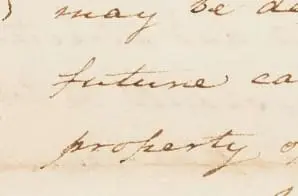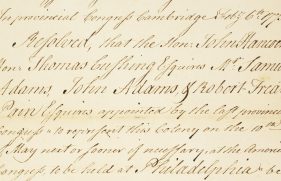George Washington sent this letter to Sir Guy Carleton, commander of British forces during the Revolutionary War, after meeting with him in person to discuss the British evacuation from New York at the end of war. It illustrates a disagreement between General Washington and Sir Carleton.
The Preliminary Articles of Peace signed in Paris on November 30, 1782, stipulated that the United Kingdom return all property that was seized during the War, including slaves. Sir Carleton, however, intended to keep the promise of freedom that was made to African Americans who joined and fought for the British. Washington demanded the return of escaped slaves, but Carleton countered that, under the King’s orders, slaves reaching British lines were to be freed.
I was surprised to hear you mention that an Embarkation had already taken place, in which a large Number of Negroes had been carryed away…my private opinion is, that the measure is totally different from the Letter & Spirit of the Treaty—But…I find it my duty to signify my Readiness, in Conjunction with your Excellency, to enter into any agreement, or take any measures which may be deemed expedient, to prevent the future carrying away of any Negroes or other Property of the American Inhabitants.
The two leaders deferred the issue to future negotiations and ordered that the names be recorded of persons boarding British ships. Britain evacuated about 3,000 enslaved African Americans, indentured servants, and freedmen to the British colony of Nova Scotia in Canada along with British soldiers.
The “Book of Negroes, or “Inspection Roll of Negroes” as the American version is called, listed those who were evacuated – to tally the loss of “property” for which the British government might compensate the United States at a later date. (No record of that payment has been found.) In 1792, over 1,000 of the new African Canadians continued on and settled back on the continent of Africa, establishing the city of Freetown, Sierra Leone.




